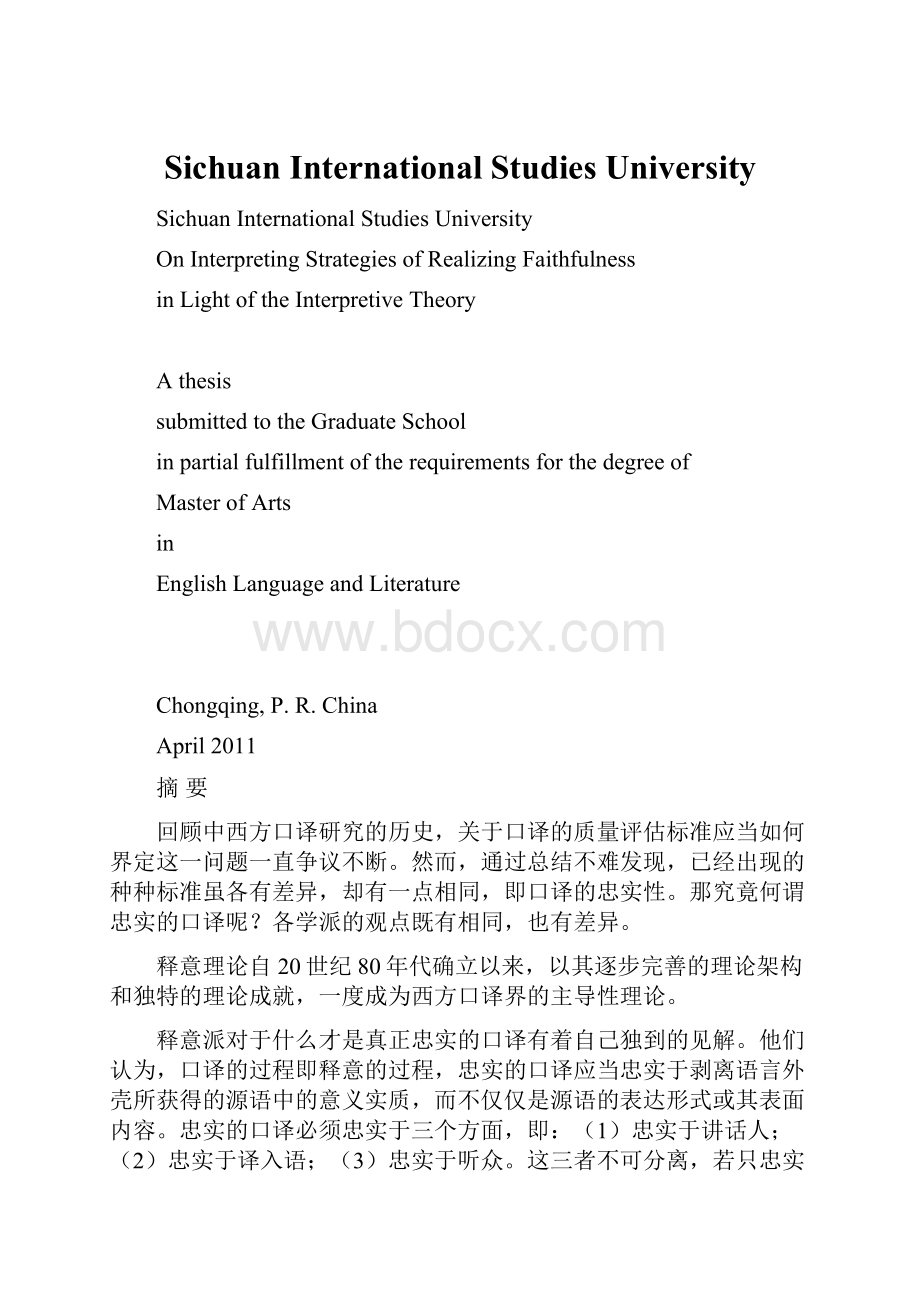Sichuan International Studies University.docx
《Sichuan International Studies University.docx》由会员分享,可在线阅读,更多相关《Sichuan International Studies University.docx(49页珍藏版)》请在冰豆网上搜索。

SichuanInternationalStudiesUniversity
SichuanInternationalStudiesUniversity
OnInterpretingStrategiesofRealizingFaithfulness
inLightoftheInterpretiveTheory
Athesis
submittedtotheGraduateSchool
inpartialfulfillmentoftherequirementsforthedegreeof
MasterofArts
in
EnglishLanguageandLiterature
Chongqing,P.R.China
April2011
摘要
回顾中西方口译研究的历史,关于口译的质量评估标准应当如何界定这一问题一直争议不断。
然而,通过总结不难发现,已经出现的种种标准虽各有差异,却有一点相同,即口译的忠实性。
那究竟何谓忠实的口译呢?
各学派的观点既有相同,也有差异。
释意理论自20世纪80年代确立以来,以其逐步完善的理论架构和独特的理论成就,一度成为西方口译界的主导性理论。
释意派对于什么才是真正忠实的口译有着自己独到的见解。
他们认为,口译的过程即释意的过程,忠实的口译应当忠实于剥离语言外壳所获得的源语中的意义实质,而不仅仅是源语的表达形式或其表面内容。
忠实的口译必须忠实于三个方面,即:
(1)忠实于讲话人;
(2)忠实于译入语;(3)忠实于听众。
这三者不可分离,若只忠实于其一或其二,而背离其他,就不是忠实于意义实质,即不是忠实的口译。
释意派还认为口译作为一种特殊的翻译活动,不是简单意义上的翻译或语码转换,而是跨文化的以语言为载体和途径的一种特殊的、复杂的交际活动。
通过对释意派理论及其研究成果的探索和学习,作者获得了不少启示也有一些自己的见解。
作者认为口译作为一种交际和交流活动,必须实现其交际意义的传达,而交际作为一种动态的活动就决定了口译的忠实原则或多或少会受到一些人为或非人为因素的影响。
因此,口译中的忠实原则有其动态性和灵活性,应当被赋予一个相对宽泛的概念。
在某些特定情况下,有些看似违反了广义上忠实原则的口译不仅是忠实的,其灵活的处理反而会更好地实现口译的目的,从而取得更好的交际效果。
本文中,作者以释意理论为理论依托,赋予了忠实原则一个相对宽泛的概念并对其加以了详细的阐释,通过对大量的口译实例的具体分析,提出了有助于实现口译忠实原则的几大策略和建议。
关键词:
释意理论;评估标准;忠实原则;策略
Abstract
Inthehistoryofinterpretingresearches,theinterpretingqualityevaluationcriterionhasalwaysbeenacontroversialandhotissueondiscussion.However,afteranoverallretrospectionofthepreviousresearches,itiseasytoconcludethatalthoughthesecriteriavaryfromonetoanother,theyallshareonethingincommon,thatisaninterpretationmustfirstandforemostbefaithful.Asforwhatthe“faithfulness”refersto,differenttheoriesandschoolsanalyzeitfromcommonbutdifferentiatedperspectives.
Theinterpretivetheorywasestablishedin1980s.Ithasalwaysbeentheguidingtheoryinthewesterninterpretingfieldforitsimprovingtheoreticalframeworkandremarkabletheoreticalachievements.
Theinterpretiveschoolhasanoriginalviewpointonwhatafaithfulinterpretationis.Theystatethattheprocessofinterpretingisactuallyaprocessofconveyingthesense.Afaithfulinterpretationmustbefaithfultothe“sense”oftheoriginalspeechgraspedduringtheprocedureofdeverbalization,yetnotsimplytheinformationonthesurfaceoritsformofexpression.Faithfulnessproposedbytheinterpretivetheoryisconsistofthreeaspects,theyare:
(1)faithfulnesstothemessageoriginator;
(2)faithfulnesstothetargetlanguage;(3)faithfulnesstothemessagereceiver.Eachoftheabovethreeaspectsisindispensable.Toachievefaithfulness,thethreemustworktogether.Aninterpretationisonlyconsideredfaithfulwhenthethreeaspectsareallrealized.Anyonethatonlybeingfaithfultooneortwoofthethreebutneglectingtheotherscannotbecalledafaithfulinterpretationsince“faithfulnesstothesense”willnotbereflectedtoafullextent.
Besides,fromtheinterpretiveschool’spointofview,interpreting,asaspecialkindoftranslating,isnotjusttranslatingortranscoding.However,itisaspecificandcomplicatedcross-culturalcommunicationactivity,withlanguageservingasitscarrierandapproach.Throughexplorationandstudyoftheinterpretivetheoryanditsresearchresults,theauthorherselfisenlightenedwithsomeofherownopinions.Shebelievesthataninterpretationmustfirstbeabletoconveythecommunicativesenseasinterpretingisacommunicativeactivity.What’smore,insuchadynamicactivityasinterpreting,theprincipleoffaithfulnessisboundtobeaffectedbysomehumanornonhumanfactorstosomeextentonrealinterpretingoccasions.Thusthefaithfulnessininterpretingactivitiesshouldbegivenarelativelybroadernotion,takingintoaccountitsdynamicsandflexibility.Undercertaincircumstances,someso-calledunfaithfulnessisactuallyfaithful.Itdoesn’tviolatetheprincipleoffaithfulnessbasedontheinterpretivetheory.Onthecontrary,theflexibleinterpretationnotonlyclearlyexpressesthesenseoftheoriginator,carriesouttheintentionoftheinterpretingactivitybutalsoachievesanevenmoreeffectivecommunicationresult.
Inthisdissertation,theauthorhasgivenfaithfulnessabroadernotionbasedontheinterpretivetheoryandanalyzeditindetailbyalargenumberofexamples.Intheend,somemajorstrategiesandsuggestionsareproposedbytheauthortohelprealizeafaithfulinterpretation.
Keywords:
interpretivetheory;evaluationcriteria;faithfulness;strategies
TABLEOFCONTENTS
摘要..................................................................................................................ii
Abstract..........................................................................................................................iii
Introduction.....................................................................................................................1
ChapterOneLiteratureReview....................................................................................3
1.1AnOverviewofInterpretingQualityEvaluationResearches.....................................3
1.1.1TheoreticalResearchesonIQECriteria...........................................................4
1.1.2EmpiricalResearchesonIQECriteria..............................................................6
1.2OnExistingQualityEvaluationCriteria.....................................................................9
1.2.1WesternCriteria.............................................................................................10
1.2.2ChineseCriteria..............................................................................................11
1.3FeatureandTendencyofInterpretingResearches....................................................11
ChapterTwoAProfileoftheInterpretiveTheory....................................................13
2.1OriginandDevelopment...........................................................................................13
2.2ThreeLevelsofTranslation......................................................................................16
2.3SenseandSenseUnit................................................................................................17
2.3.1Sense..............................................................................................................18
2.3.2SenseUnit......................................................................................................18
2.4ThreeProceduresofSenseProduction.....................................................................19
2.4.1Comprehension..............................................................................................20
2.4.2Deverbalization..............................................................................................21
2.4.3Re-expression.................................................................................................22
ChapterThreeRealizationofFaithfulnessundertheInterpretiveTheory............23
3.1FaithfulnessasaCriterionofInterpretingQualityEvaluation.................................23
3.1.1RelevantConcepts.........................................................................................23
3.1.2TheImportanceofFaithfulnessinEvaluatingInterpretingQuality..............24
3.1.3FaithfulnessProposedbytheInterpretiveTheory.........................................25
3.2BroaderNotionofFaithfulness.................................................................................27
3.2.1CompleteFaithfulness...................................................................................28
3.2.2PartialFaithfulness........................................................................................29
3.2.3FaithfulUnfaithfulness..................................................................................30
3.3StrategiesofRealizingFaithfulnessinLightoftheInterpretiveTheory............32
3.3.1InformationIntegrationandLogicInference.................................................32
3.3.2RestructureandAdjustment...........................................................................34
3.3.3Amplification(explanation)andOmission....................................................37
3.3.4Acculturation..................................................................................................39
3.3.5Interpreter’sFreedom.....................................................................................43
Conclusion.....................................................................................................................44
WorksCited...................................................................................................................47
Introduction
Inthelonghistoryofinterpretingresearches,thequalityevaluationcriteriaforinterpretingproposedbyresearchersandscholarsvaryfromonetoanother.Afteracomprehensiveretrospection,itiseasytoconcludethatalthoughdifferenttheoriesandschoolsanalyzetheIQEfromtheirrespectiveperspectives,theyallshareonecriterionincommon—faithfulness.Howeverasforwhatthefaithfulnessshouldbeinrealsense,there’snodefiniteanswer.
Sinceitsestablishmentin1980s,theinterpretivetheoryhaslongbeenintheleadingplaceamongallthewesterninterpretingtheories,foritscompletetheoreticalframeworkanddistinctperspective.Basedonobservationandanalysisofon-spotinterpretingpractices,theinterpretivetheorystatesthatwhataninterpretershoulddoistoconveytheoriginalintentionofthespeakerratherthanthelanguageitself,sinceinterpretingisacommunicativeactivity.Theyalsobelievethataninterpretationcanonlybecalledafaithfulonewhenitliesonthelevelofdiscourseandtointerpretisnotjustsimplytotranscode.
The